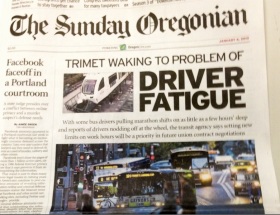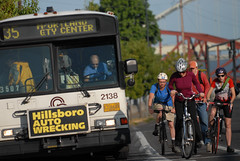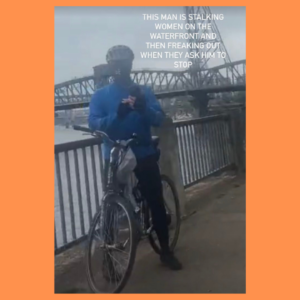
On Sunday, The Oregonian published a major front page story on the issue of driver fatigue at TriMet. The report was the result of an eight month investigation into driving records and the findings are quite disconcerting to say the least. As someone who regularly shares the road just inches from buses and MAX trains, the thought that a driver might be drowsy or asleep at the wheel is very scary.
The Oregonian story recounts several anecdotes and backs them up with TriMet’s own reports and other documentation. In one example, reporter Joseph Rose wrote that, “In a 2010 case a veteran Line 75 driver decided to retire rather than fight a report that he fell asleep at the wheel ‘almost every day.'” When a rider complained that one driver had completely fallen asleep at a stop, the driver was never disciplined.
TriMet Director of Operations Shelly Lomax told the paper, “We do not have a policy against closing one’s eyes.”
The story cites several reasons for the “culture of exhaustion” at TriMet. Chief among them is that it’s cheaper for the agency to pay for overtime than to hire more operators and union rules are too easily bent by operators eager to rack up overtime pay.
Here’s more from The Oregonian:
“the budget-battered agency allows operators to manipulate work rules to log as many as 22 hours in a 24-hour period, filling open runs and fattening paychecks but crashing vehicles and terrifying riders along the way… The Oregonian found that many drivers spend 18, 19, 20 hours or more on the job in 24 hours.”
Local TriMet watchers are calling the revelations in the story, “shocking” and “disturbing.”
From a bike perspective, this problem is even more of a concern. Many of the busiest bike routes throughout the city — like SE Hawthorne and N Williams — are also high-frequency bus lines. On the new protected bike lanes on NE Multnomah Blvd in the Lloyd District, bikes and buses mix at intersections and stops. In locations like these, even a momentary lapse of attention can result in tragedy.
There’s a certain level of trust we put into the hands of bus operators. We expect them to be aware and alert in order to not run into us. TriMet must now rebuild that trust.
TriMet has responded to the story on their blog. Lomax wrote, “We… assure you that we have a safe system that you can trust.” The response did not directly address the facts published in The Oregonian story, nor did it outline any immediate policy changes.
We’re waiting to see what TriMet does to address their driver fatigue problem. Assurances on a blog that safety is a “core value” mean nothing when actions prioritize cost-cutting over public safety. The community should not settle for anything less than strong policy changes, discipline when necessary, and other actions to rebuild public trust.
— Read The Oregonian story here.








Thanks for reading.
BikePortland has served this community with independent community journalism since 2005. We rely on subscriptions from readers like you to survive. Your financial support is vital in keeping this valuable resource alive and well.
Please subscribe today to strengthen and expand our work.
I don’t read the O online very often. But I have to say that the few times I do, I get really frustrated that is it quite clear that the “commuting” writer (Rose) continually attempts to portray cycling and transit in a bad light (granted I think this article brings up a good topic to discuss). But has he ever written anything negative about motorists? Just seems so biased to me (granted I’m biased as well, but I’m not writing for the major paper in the city and then trying to pass myself off as neutral).
Rose’s feeble efforts to have his writing be somehow humorous, put me off, so I usually tend to skim over or skip his column and other writing entirely. He may call out bad driving on occasion. I seem to recall, some months back, he did take occasion to fault drivers that, in backed up traffic, use the right lane to skip ahead and cut in front of cars further up the line.
Mostly though, his writing seems to me to have been lightweight, basically entertainment material for the paper. This seemingly well researched, seriously written story about Trimet’s very dubious decision to allow drowsy drivers to be responsible for the safety of people riding the bus, and to present a high potential of negatively affecting other people using the road, was certainly a departure from his usual style, and a good one.
Included in the story was the remark that the story had been worked on for 8 months. Maybe that is part of the reason this story is better than much of what the O has come to known for of late.
“I seem to recall, some months back, he did take occasion to fault drivers that, in backed up traffic, use the right lane to skip ahead and cut in front of cars further up the line.”
Your recall is poor. The entire article was trying to explain how this is legal behavior and should be encouraged. It isn’t “skipping,” it is using the lanes legally and reducing headaches for all drivers. He cited several sources and his article actually resulted in some change for the location identified.
I only remember the one about people using the left lane up to St John’s bridge to pass the stopped cars and how it’s legal and people are breaking the law when they try to prevent people from using the left lane to pass…
Another possible factor, from my days as a TriMet employee: At that time (more than five years ago), TriMet was having trouble attracting applicants. Folks who wanted to drive big vehicles could make more money driving long-haul trucks, and such jobs were easy to find.
I’d be a little surprised if trucking offered better overall compensation (especially considering TriMet doesn’t require any large-vehicle experience), but in any case trucking should be a lot less stressful. There’s no passengers to deal with, no fares/customer service/etc, no constantly pulling in and out of stops, probably a lot less urban driving and traffic…
Maybe this is a problem, and maybe it isn’t. The O has published so much clearly inflammatory half-truth and outright falsehood that I don’t place much stock in anything it prints.
I hear you Fred. I would just say that it’s hard to judge a media source as large at The O. They have a lot of good reporters and they do important work… But they also have some issues about their editorial leaders, their right-leaning ownership, and so on. I try and judge each story by its merits.
Yes, that’s true. And I agree it’s dangerous to over-generalize. There are a few good people working at the O (I actually have some friends who write for them), but their editorial policy really seems to be to go for the most inflammatory, divisive, controversy-stirring angle possible, even if the facts don’t merit it. “Sewer money for bike lanes!”, “Bikes vs. Cars”, “Potholes Go Unrepaired to Pay for Bike Boulevards”, etc., etc., ad nauseum.
It’s bad journalism, plain and simple. They seem to go into stories with a preconceived notion (i.e. a bias) that there will always be an x vs. y. Not all stories have two sides, the world is more complex than that. But of course, that doesn’t sell papers or pack the comment sections with angry eyeballs.
Any plans for a story about the culture of “fake busy?” You know, people alleging to be so important that we should just all learn to deal with the fact that they are too busy texting, phoning, logging in, surfing, shaving, and keeping the venti hazelnut mocha from spilling on the remote that they don’t have time to watch the road, let alone give a frack about anybody else on it?
Nah, wouldn’t want to alarm anybody.
I read this article on O-Live yesterday and I honestly don’t know what to think.
On one hand, yes of course it is a concern of mine and everyone else traveling in the Portland Metro area. Buses and MAX trains are gigantic vehicles and we trust the operators to be alert. On the other hand, the Oregonian has lost so much credibility with me that any article they write, no matter what the topic, I always read it with skepticism.
So the true question becomes, has there been a spike in accidents involving Tri-Met drivers and pedestrians and/or bikes over the last few years? I know there have been accidents, but as their been MORE accidents is the question. I didn’t see any evidence in the article that indicated an increase in number of incidents, an increase in injuries, or an increase in transit fault deaths. Maybe I missed it. The “incident reports” they cite amount to a lot of he said/she said type scenarios with no proof. If someone reports an incident with a driver that doesn’t mean anything actually happened.
I also can’t help but notice the article focuses a huge amount of attention on driver pay, union rules, and benefits. Is that what this is all really about?
I agree that this report may be cause for concern. However, considering the source I can’t help but reserve judgment and a recommendation for action until I see a more unbiased investigation. That speaks a lot more against the Oregonian then it does in favor of or against Tri-Met. Again, given the source and how little credibility I give them, my gut instinct tells me this is a whole lot of fear mongering to sell newspapers.
Nice to see good old-fashioned investigative reporting. TriMet is clearly operating beyond its means, like 99% of America. Their blog says this problem is “rare.” I would like it to be “non-existent” please.
Joe Rose is an angry man. If only he’d find a new way to vent rather than lambast TriMet and bicyclists every day on this blog.. The O’s decision to put his coffee shop rants on the front page indicates they really have nothing to write about anymore..
Was he the one who wrote the article about how awful the coffee is at PDX? Burnt milk, lattes that are too hot? First world problems, indeed.
I’m certain I didn’t write that one.
As for any stories criticizing motorists, I write plenty. (Indeed, as a nearly-everyday bicycle commuter who often uses Car2Go to cover traffic, I’m inspired by what I see on my ride. Example: This video I made of motorists who can’t seem to figure out the basic rules of bike lanes.
http://blog.oregonlive.com/commuting/2011/09/the_right_–_and_wrong_–_ways.html
I’ve also had the recent distinction of being lambasted by Bojack as too pro-bike for writing this:
http://blog.oregonlive.com/commuting/2012/12/bicyclists_pedestrians_and_tri.html
I won’t bore you with other stories. The vast majority of my readers are auto and TriMet commuters, so I have to keep that in mind. I may not address bike issues as Jonathan does on this very cool site, but I care about them.
I’m always open to feedback, critiques, educational rides and an after-work beer.
Cheers,
Joseph Rose
The Oregonian
Joe, I’ve tried to express this before, but it has fallen on deaf ears. I’ll try again. I honestly believe and respect the fact that you try to tell “both sides of the story” and you feel that in doing so, you are providing balanced, objective reporting. I don’t think you necessarily have a bias towards one mode of transportation or another. The problem is that the conceptual framework of this approach is itself a form of bias, one that is encouraged and exploited by your paper’s editorial positions.
The very idea of “car perspective” versus a “bike perspective” is objectively not true. Transportation is not a story with two sides, there are not two opposing teams, one yelling “black” to the other team’s “white”. This is a fabrication. This is not to say that there is not conflict on the roadway sometimes, or that the interests of different users are never conflicting. It is to say that by using this Manichean lens, you both distort and polarize user groups while obscuring or completely ignoring the many areas of over-lap, the many issues that have nothing to do with conflict, and the actual nature of the real humans who use our transportation system.
Of course, this can then become a self-fulfilling prophecy as people go on to identify with and against the fictional groups, which gives them a way to interpret the actions of others that they don’t understand, and a way to identify themselves as being victimized or unfairly treated because of “those other people.” And it is that way, by writing about a fictional war, that a real one sometimes breaks out.
When you say to yourself, this is a “bike” story and I will balance it with a “car” story, you are imposing that dichotomy on reality. That’s not good reporting. I urge you to reexamine your assumptions and let the truth dictate the form of your stories, rather than a preconceived model.
Thanks.
I’ve only met Joe a few times, but he seems pretty chill, and he commutes by bike pretty regularly.
The O editors that direct his work may be angry, but I suspect they’re in a desperate effort to generate controversy and also please their baby-boomer, suburban subscriber base.
If you want to suggest a different strategy to the O editors, this is a good place to let them know you care. http://biz.oregonian.com/feedback/
Ted Buehler
Doesn’t the trucking industry have regulations and fed/state mandated log sheets so that drivers can only work so many hours behind the wheel? Maybe it could be a model to consider.
Nice investigative reporting by The Oregonian.
Gathering data, summarizing data into digestible facts, and presenting it in a way that the masses can relate to is one of the fine roles of print media. Thanks for keeping this up, O!
Ted Buehler
A lot of TriMet Ops love overtime and look for all they can get each sign up…every three months. The union will protect this option, and it does save the agency money…meaning more service for riders. I have not seen a spike in accidents, so what’s the problem? I have more confidence in TriMet than in the Oregonian, frankly. Now if they would write a piece on all the grumpy Ops out there! At least they are awake I guess!
Lenny — this is the problem for me:
If drivers falling asleep is a growing trend, we’ll have more incidents like this —
http://www.youtube.com/watch?v=hw28Xoi1aTE
— unless we take action now.
I read the article in the print edition, I didn’t get the idea it was being overdramatized. Drowsy drivers are not good drivers.
Ted Buehler
That is my question as well.
Is there evidence that accidents have increased with Tri-Met drivers being at fault over the last few years? Isn’t that the biggest question we should all be asking? Why was that not discussed in the original article?
If there is evidence of increased accident rates then yes, immediate action needs to happen.
If there isn’t evidence of increased accident rates then this seems to be more an issue of overtime pay, operating costs, and hiring practices. All of those things are worthy of discussion. However, they typically don’t spark a lot of outrage and they certainly don’t make people afraid, both of which this article is doing plenty of.
The biggest take away from this article for me is that tri-met is making some poor hiring decisions. The average employee salary listed was calculated assuming some significant levels of overtime. I’d like a better analysis of if this system of underhiring is actually saving them money. I’d say that maybe if people weren’t working so much overtime they might not be calling in sick to 10% of their regularly scheduled shifts…
I agree, I was rather shocked to read in the article that working on your birthday is considered a holiday and nets you 2.5X your normal pay! What other job out there is that true for?
I’m a vocal supporter of transit, but that’s messed up.
Your birthday isn’t a holiday and you don’t get paid time and a half or double. You can take a day off within 30 days of your birthday for your birthday. it’s kind of like a floating holiday but you certainly don’t get OT. it’s regular pay, if you don’t take the day you lose the benefit until the next calendar year.
I thought I had read that in the article (maybe it was in the comments). After skimming it again I stand corrected.
I’m also not convinced that underhiring is a money saver, especially if a causal link exists between volume of overtime logged and drowsiness (not crazy at all to imagine). Drowsiness would seem to be a phenomenon easy to scientifically link to higher number of collisions. And the logical budgeting reaction is to reserve more money to pay for more collisions, scientifically predictable within a large data set (say 5 years of service). I think I’m stating the obvious as implied by the article. It DOES seem like trucking safety laws should be applied to people payload truckers too. I’m too lazy to investigate the contrasting safety-based legal restrictions, but very curious.
i thought trimet drivers were on dope? thanks for clearing this up!
they’re just a bit drowsey from sucking on the over-time teet evidently. perfectly safe & acceptable.
carry on….
@davemess: If you’re jealous of holiday pay on birthdays (and other union benefits) maybe you should be unionized.
Ryan there is nothing I would love more than to have a PhD student union.
I’m quite pro-union (both of my parents are teachers), I just read that stat (I don’t know where) and it seemed kind of ridiculous. I think most would agree that some unions have pushed the boundaries a little too far.
This is truly shocking. I mean, I never see state, city, county, or port employees or their contractors doing busy-work on nights, weekends, or holidays. My neighbor is a police detective in a large city, uses motor pool vehicles for almost all of his extensive driving (45-mile commute one-way), and has an expensive Porsche in his garage with a license plate that he admitted to me is short for “King of Overtime”… but I’m sure he’s an exception. And now you’re telling me there’s a government-subsidized company where the rules are being bent? I don’t believe you.
TriMet Ops are highly trained professional drivers. The real threat to us bikers is from all those amateurs on their cell phones behind tinted glass. How about some enforcement on this front from PPB.
Overtime is something some folks like and some folks don’t…I used to offer my OT to colleagues when I ran presses. Skilled operators of any machine know when its time to take a break, though mistakes do happen and always will. When it does, they always pay big time.
The O’s shrill headlines bore me.
MORE service for riders? Really? Routes were cut and frequencies decreased on multiple remaining lines when the last fare increase and systemwide re-zoning went into effect. So far, little if any of that service has been restored. Show me where the savings is actually going. I have serious doubts that it is going to increase service.